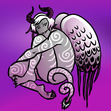Siavahda's Blog, page 95
November 9, 2020
Move Over, Howl, There’s a New Heart-Eater In Town: Night Shine by Tessa Gratton
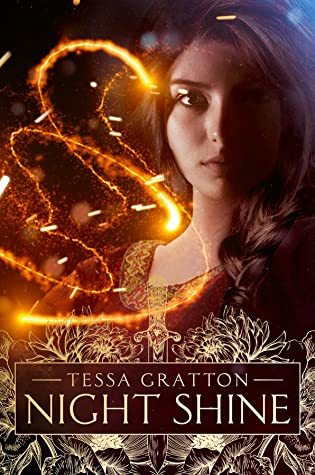
Night Shine by Tessa Gratton
Representation: F/F, major genderfluid character, minor nonbinary character
on 8th September 2020
Genres: Queer Protagonists, Secondary World Fantasy
Goodreads

An orphan girl must face untold danger and an ancient evil to save her kingdom’s prince in this lush, romantic fantasy perfect for fans of Girls of Paper and Fire and Tess of the Road.
How can you live without your heart?
In the vast palace of the empress lives an orphan girl called Nothing. She slips within the shadows of the Court, unseen except by the Great Demon of the palace and her true friend, Prince Kirin, heir to the throne. When Kirin is kidnapped, only Nothing and the prince’s bodyguard suspect that Kirin may have been taken by the Sorceress Who Eats Girls, a powerful woman who has plagued the land for decades. The sorceress has never bothered with boys before, but Nothing has uncovered many secrets in her sixteen years in the palace, including a few about the prince.
As the empress’s army searches fruitlessly, Nothing and the bodyguard set out on a rescue mission, through demon-filled rain forests and past crossroads guarded by spirits. Their journey takes them to the gates of the Fifth Mountain, where the sorceress wields her power. There, Nothing will discover that all magic is a bargain, and she may be more powerful than she ever imagined. But the price the Sorceress demands for Kirin may very well cost Nothing her heart.
Move over, Wizard Howl; there’s a new eater of hearts in town. And she’s far more swoon-worthy than you ever were.
A big chunk of fantasy readers about my age (and older, and younger, for that matter) will remember Diana Wynne Jones’ Howl’s Moving Castle. Others might know the story from the Studio Ghibli adaption of the book.
I sat up and paid attention way back when all we knew about Night Shine was its pitch: Howl’s Moving Castle, but queer. That was enough to sell me, and Night Shine was one of my most anticipated reads of the year.
It does not disappoint!
Nothing is a young woman who lives in the walls of the palace, an orphan who would have no place if she hadn’t the friendship and favour of Kirin Dark-Smile, the prince and heir. No one knows where she came from, and no one particularly cares, so long as she stays quiet and out of the way and lets people forget about her.
Instead, she does something spectacular, and has to go rescue the prince from a sorceress who only steals girls, not boys – and yet has taken Kirin.
Night Shine is simultaneously a beautifully simple and delightfully intricate novel. On one level, I could lay out the plot for you in a sentence or two, but to do so would be to cut the heart out of this story; you would miss so much! You would miss Gratton’s light, deft hand with her worldbuilding, the way she lets details fall just-so so that their ripples paint the shape of a world as big and real and vital as our own. You would miss all the cunning loopholes Nothing can slip through via gleeful worldplay; you would miss celestial unicorns and river-dragons and most of all – most of all you would miss the arc of a girl called Nothing becoming…Everything.
There’s just so much to love here, I don’t know where to start. Maybe the place to begin is with the way Gratton contrasts the relationships that make up the story: Kirin + Nothing, Kirin + Sky (Kirin’s bodyguard and secret lover), Sky + Nothing – and Nothing + the Sorceress Who Eats Girls. This is very much a book about love, but not the soft, starry-eyed kind; it’s about love as a feral, strange thing, eerie and beautiful, with sharp edges and feathers. Neither of the loves on offer to Nothing – as part of a polyamorous relationship with Kirin and Sky, or the love of the Sorceress – are conventional (to the reader – the set-up Kirin, Sky and Nothing have been planning to enter into for years is perfectly normal within their culture); but still, there’s a very stark (and, I think, deliberate) difference between the relationship of Nothing and Kirin, and Nothing and the Sorceress. It’s one that I found absolutely thrilling; on the one hand is a literal prince, Nothing’s childhood friend and benefactor, the person she has always believed would be her future. And on the other side is this powerful, frightening woman, who takes the hearts of young women for her dark magic.
I mean, it’s not even that most stories would make the decision between the two love interests obvious; in most stories, the sorceress wouldn’t even be an option, and not because she and Nothing happen to share a gender. She’s dark! Scary! She shapeshifts and she kills people and she deals with demons! (More on the demons later). This is not someone who’s supposed to be a love interest! This is someone who’s supposed to be the villain!
So it is just beyond amazing to me that Gratton takes all of that – everything the Sorceress is – and makes her a love interest anyway. Like – screw your ideas of traditional romance; monsters make awesome girlfriends.
(It’s so much more complicated than that. It’s so rich and vital and mutable, refusing to be pinned down and neatly labelled. There’s no box to neatly tuck this into. This isn’t a familiar trope, we don’t recognise this story-pattern, arc-pattern, when we encounter it. We have no map for this. This is uncharted territory, and it’s beautiful.)
I’ve been working on an essay for a while know about how queerness and magic are intertwined, but Gratton got there before me, and I don’t resent it at all because she’s demonstrated and explained it so well. Magic is about liminal spaces, the Sorceress tells Nothing; it’s about refusing labels, stepping outside the norm, rejecting the role society demands you fill. And really, the entire story of Night Shine is about liminal spaces, places, people. Nothing literally lives inside the walls of the palace, and, I mean, the entire story is kicked off by the fact that Kirin is genderfluid; if he weren’t, there would have been no story at all. So the book starts from that point – Kirin’s genderfluidity – and never really goes back to the non-liminal world. Just in case the reader’s missed it, Gratton makes it even clearer once Nothing and Sky leave the palace in order to rescue Kirin; with the help of a powerful spirit, the miles and miles dissolve around them, the two stepping outside of normal reality to reach Kirin far more quickly than they would have been able to otherwise. It beautifully illustrates the point that they’ve left the world they know behind, pretty literally moving into a space where the old rules – and their old selves – no longer apply.
Nothing herself is nothing (her name) and not-nothing (because she exists) at the same time. It’s the very core of the book, and the concept is worked into every aspect of the story in truly wonderful ways – many of which I can’t share, because spoilers, but trust me, they’re impressive and delightful.
Things are not what they seem, in Night Shine; there are secrets where there should be truth, and betrayals where there should be trust, and good and bad aren’t nearly as simple as black and white. Sages wreak harm and sorceresses offer love. It’s unique and unexpected.
I swooned over every last detail, pretty much. Not least Nothing herself; I loved watching her grow over the course of the story, grow into something bigger and louder and wilder and strange, so different to the quiet, near-invisible person she is at the start of the book. I think you could read it as…some kind of commentary on femininity; the idea of girls breaking out of the moulds they’re placed in; the idea of femininity as wild and maybe a bit terrifying, something to be feared and respected and embraced. Gratton’s girls are not tame creatures, even if Nothing looks like one to begin with.
I could write an essay on Nothing’s name, okay? On the fact of a girl – when girls are so often dismissed as nothing – literally being named that (so awful, but so clever). On how the story subverts and twists that – Nothing being Nothing means she slips through those loopholes I mentioned earlier (imagine a spell that says ‘nothing can enter this place!’ Nothing could walk right through, couldn’t she?) On how being nothing is a power – the quiet, slippery, clever power of women throughout history. And on how someone named and dismissed as Nothing is anything but.
And can we talk about the spirits and demons for a sec? These otherworldly creatures who live in flowers and ponds and mountains and rivers, some of them teeny-tiny and some of them massive, and massively powerful. I adored how strange and lovely they were, and how they communicated and the things they liked and didn’t – some of my favourite moments revolved around Nothing talking to a small spirit that was ignored by most other people. Gratton created this whole eco-system of magic, and I am still just fascinated by how spirits can die and become demons – which does not, in this context, refer to a scary malevolent monster, but a spirit that can no longer draw on the aether. Except for the Greater Demons, who are big enough and powerful enough that even when they die, they can draw on the aether and don’t need to bond with a witch or sorcerer to survive. The ways in which humans and spirits co-exist in this world just delighted me over and over again!
Another minor (but game-changing, imo) worldbuilding detail is this: instead of giving us strange, unpronouncable fantasy-names (which I, personally, struggle to remember and keep track of), Gratton gives us the names of characters as if the reader were a native speaker. What that means is, instead of a character being named Elyshteronwë (which I have just made up) or something, and the author explaining that this means Day-The-Sky-Opened…we have a character named The Day the Sky Opened. Whose usename/nickname is Sky.
I know that seems like such a small thing, but it’s actually a pretty major deal. By treating the reader like a native of the world she’s writing about, Gratton breaks the fourth wall and draws the reader into the story in a way many fantasy stories don’t. We know what the names mean. We hear the names exactly as a native of this book would. To write Elyshteronwë throughout the book, instead, is to put up a wall between the reader and the world; it says, you are a visitor here. You don’t know the language. You don’t know the people.
Instead, Gratton carefully brings the reader in instead of shutting us out. We don’t hear gibberish when we’re told the Empress’ title: instead we know she is The Empress with the Moon in Her Mouth. Which, besides being a beautiful title, means we know her as her own subjects do. It’s as if Gratton waved a wand and made her readers bilingual, and it’s such a small thing, but it delights (I loved, loved, loved all the names!) and it has a powerful effect on the reader.
At least, it did me!
I’ve been working on this review for weeks, and to be honest I could probably keep going for another month. But the best way to learn how awesome this book is is to pick it up for yourself. Night Shine is without question one of the best books of the year, and if you let it pass you by, you are depriving yourself of a genuine treasure.
Now if you’ll excuse me, I have all of Gratton’s backlist to work my way through!

The post Move Over, Howl, There’s a New Heart-Eater In Town: Night Shine by Tessa Gratton appeared first on Every Book a Doorway.
October 25, 2020
Some Recent Reads (and mini-reviews)
I have read some seriously amazing books lately, but I don’t have a whole lot to add to the already excellent discussion around them – which is why I’m not reviewing them properly. But here are a few points about some of my recent reads!
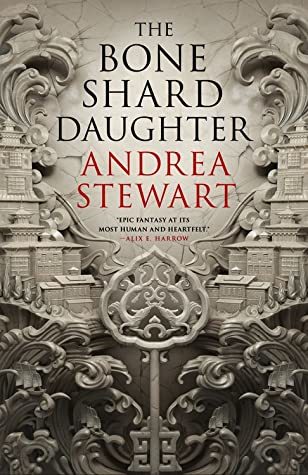
The Bone Shard Daughter (The Drowning Empire, #1) by Andrea Stewart
Representation: F/F or wlw, cast of colour
on 8th September 2020
Genres: Epic Fantasy, Queer Protagonists
Goodreads

In an empire controlled by bone shard magic, Lin, the former heir to the emperor will fight to reclaim her magic and her place on the throne. The Bone Shard Daughter marks the debut of a major new voice in epic fantasy.
The emperor's reign has lasted for decades, his mastery of bone shard magic powering the animal-like constructs that maintain law and order. But now his rule is failing, and revolution is sweeping across the Empire's many islands.
Lin is the emperor's daughter and spends her days trapped in a palace of locked doors and dark secrets. When her father refuses to recognise her as heir to the throne, she vows to prove her worth by mastering the forbidden art of bone shard magic.
Yet such power carries a great cost, and when the revolution reaches the gates of the palace, Lin must decide how far she is willing to go to claim her birthright - and save her people.
This one played me like a yo-yo before it came out; I was super excited for it, then I wasn’t, and then I was again. I’m glad I gave it a chance, because it’s absolutely wonderful and turned out to be one of my faves of the year. A magic system very reminiscent of coding but fuelled by the life-force of the empire’s citizens; casual queerness and nobles learning to see their privilege; fantastic magical creatures and a twisty, terrifying conspiracy. It’s also one of the few books I’ve ever read that switched between first and third person for the different PoV characters, which worked really well here.
I’m also in the rare position of not having a clue about where this series is going – Stewart seems to love keeping her readers on her toes, which I have no objections to! It just makes me more eager for the sequel. Usually by the end of book one, you have a decent idea of the shape the series is going to take, even if the details are still up in the air. But this time, I’ve got nothing, and I find that really exciting.
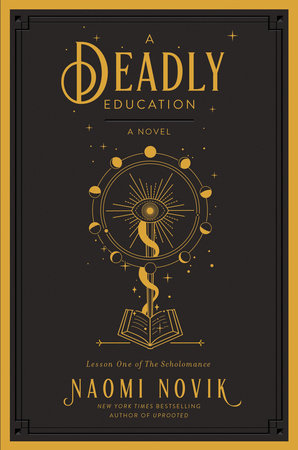
A Deadly Education (The Scholomance, #1) by Naomi Novik
Representation: Biracial MC, secondary characters of colour, economic disparity
on 29th September 2020
Genres: Fantasy
Goodreads

From the New York Times bestselling author of Uprooted and Spinning Silver comes the story of an unwilling dark sorceress who is destined to rewrite the rules of magic.
I decided that Orion Lake needed to die after the second time he saved my life.
Everyone loves Orion Lake. Everyone else, that is. Far as I’m concerned, he can keep his flashy combat magic to himself. I’m not joining his pack of adoring fans.
I don’t need help surviving the Scholomance, even if they do. Forget the hordes of monsters and cursed artifacts, I’m probably the most dangerous thing in the place. Just give me a chance and I’ll level mountains and kill untold millions, make myself the dark queen of the world.
At least, that’s what the world expects me to do. Most of the other students in here would be delighted if Orion killed me like one more evil thing that’s crawled out of the drains. Sometimes I think they want me to turn into the evil witch they assume I am. The school itself certainly does.
But the Scholomance isn’t getting what it wants from me. And neither is Orion Lake. I may not be anyone’s idea of the shining hero, but I’m going to make it out of this place alive, and I’m not going to slaughter thousands to do it, either.
Although I’m giving serious consideration to just one.
With flawless mastery, Naomi Novik creates a heroine for the ages—a character so sharply realized and so richly nuanced that she will live on in hearts and minds for generations to come.
I’ve loved all of Novik’s books, bar a few rough spots in the Temeraire series – and who didn’t sit up and cheer when the announcement of a dark, feminist witch-school story came right on the heels of R*wling being such an irredeemable git? I absolutely loved Deadly Education, even though the premise was so dark and horrifying; that these kid-mages have to survive alone in a school packed full of monsters, because there’s even more monsters outside. A lot of thought went into the worldbuilding, which is just complicated enough to feel very real and justify this system of schooling, and which all fits together perfectly. The characters are all brilliant, especially the narrator El, whose destiny seems determined to make her a supervillain even as she grumpily refuses to go all Dark Lady on assholes who would totally deserve it (it is so very appropriate that her full name is Galadriel, who also had to resist the temptation of becoming a Dark Lady in LotR), and the school itself is basically a character too in some very cool ways. The book has a lot to say about classism and economic disparity and privilege, specifically the privilege of wealth, without really shoving it down your throat, but beautifully illustrating its points nonetheless. There’s no getting away from the fact that the situation these kids are in is horrifying, but Novik manages to balance it out pretty well with unexpected wryness and poignancy, and it’s perfectly addictive. I’ve already preordered book two!
(There’s a very, very good reason no heterosexual sex is happening inside the school, but I hope Novik’s aware that in the scenario she’s set up, there ought to realistically be a rife of queer sex going on. I’d like to believe that’ll get a mention at some point, but if not I guess that leaves plenty of room for fanfic to fill in the blanks.)
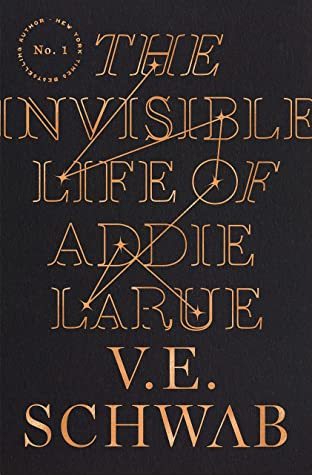
The Invisible Life of Addie LaRue by V.E. Schwab
Representation: Pansexual MC, pansexual love interest, gay and lesbian side characters
on 6th October 2020
Genres: Fantasy, Queer Protagonists
Goodreads

France, 1714: in a moment of desperation, a young woman makes a Faustian bargain to live forever-and is cursed to be forgotten by everyone she meets.
Thus begins the extraordinary life of Addie LaRue, and a dazzling adventure that will play out across centuries and continents, across history and art, as a young woman learns how far she will go to leave her mark on the world.
But everything changes when, after nearly 300 years, Addie stumbles across a young man in a hidden bookstore, and he remembers her name.
In the vein of The Time Traveler's Wife and Life After Life, The Invisible Life of Addie LaRue is New York Times bestselling author V. E. Schwab's #1 New York Times Bestselling Author genre-defying tour de force.
Sorry-not-sorry: I’ve never been able to finish a Schwab book before. I’ve bounced off them all. But this one I managed to get through, and I enjoyed it a lot. I didn’t quite love it, but since I’ve always thought immortality would be wonderful because there’s always something new to learn and see, it was great to see a take on immortality which was all about that – I’m so bored of immortals who are tired of life and all cynical and ennui and whatever. Addie’s version of immortality is pretty miserable, though, and Schwab tread a very careful line between getting that across and making the story terribly depressing. It was a hopeful book instead, without being trite. I’m not sure I’ll try Schwab’s other books again (since I’ve tried them all multiple times already) but I’ll be keeping an eye out for what she writes in the future.
Have you read any of these? What did you think? Let me know in the comments!

The post Some Recent Reads (and mini-reviews) appeared first on Every Book a Doorway.
October 17, 2020
You’ll Never Side With the Superheroes Again: Hench by Natalie Zina Walschots
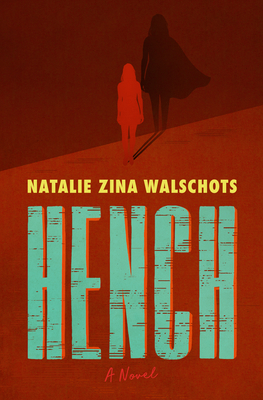
Hench by Natalie Zina Walschots
Representation: Bi/Pansexual MC, disability, characters of colour, minor genderqueer character, secondary gay and lesbian characters
on 22nd September 2020
Genres: Queer Protagonists, Sci Fi
Goodreads

Anna does boring things for terrible people because even criminals need office help and she needs a job. Working for a monster lurking beneath the surface of the world isn’t glamorous. But is it really worse than working for an oil conglomerate or an insurance company? In this economy? As a temp, she’s just a cog in the machine. But when she finally gets a promising assignment, everything goes very wrong, and an encounter with the so-called “hero” leaves her badly injured. And, to her horror, compared to the other bodies strewn about, she’s the lucky one.
So, of course, then she gets laid off.
With no money and no mobility, with only her anger and internet research acumen, she discovers her suffering at the hands of a hero is far from unique. When people start listening to the story that her data tells, she realizes she might not be as powerless as she thinks.
Because the key to everything is data: knowing how to collate it, how to manipulate it, and how to weaponize it. By tallying up the human cost these caped forces of nature wreak upon the world, she discovers that the line between good and evil is mostly marketing. And with social media and viral videos, she can control that appearance.
It’s not too long before she’s employed once more, this time by one of the worst villains on earth. As she becomes an increasingly valuable lieutenant, she might just save the world.
I learned about Hench by – well, not quite luck, but KA Doore’s incredible list of 2020 Queer Adult Science Fiction & Fantasy Books. It was a very small mention (there’s not a lot of room on the list!), but the book was described thusly
– so queer is anyone even cis-het??
– superheroes are terrible and it pays better to work for the villain (plus they have health insurance)
– spreadsheets as superpower
Despite not being able to find out basically anything else about it, I was SOLD SO HARD. It sounded like a ridiculously cool premise! And again, despite not being able to find any reviews or pre-release hype about it, it was probably the book I was most excited to read in September.
(Which, considering how many epic books came out in September, is HUGE).
And then I picked it up…and I could not put it down.
Why was Doore the only one talking about this??? Why was it not all over every rec list in existence??? Hench is freaking fabulous!
Anna is a fantastic heroine (although she’d probably stick me with her taser-cane for calling her that) that I gelled with immediately; a fellow millennial trying to get by in an utterly ridiculous world. When the book opens, she’s trying to juggle her online grocery cart with the tiny amount left in her checking account, praying for the temp agency to call. She’s so very real from the very first page, someone just about all of us can empathise with so very easily.
Except…the temp agency is a temp agency for villainous henchpersons. Shouldn’t we balk? Doesn’t this mean she’s a bad guy???
Well, no. See the aforementioned juggling of the grocery cart. She’s just trying to get by. She works on data input, for crying out loud; she’s not laughing maniacally while murdering people. She’s commiserating with her friends about the job market and bosses who just do not know how to use a computer. She digs deep for patience when her boss wants to know about her feelings. She has no patience for idiots who will not put their phone on vibrate, no matter how many times the volume and intensity of their ringtone has been brought up as problematic for their coworkers.
She’s any of us. All of us.
And then she gets caught in the crossfire between a villain and a hero.
The last few years (the last decade?) there’s been a trend of gritty stories that try to ask whether superheroes are really heroes. The MCU had a go at it (which, wow, underwhelming take on the Civil War arc or what), the Batman vs Superman movie kinda sorta went there, and my husband has been greatly enjoying The Boys, adapted from the comics of the same name. (It’s too gory for me, but I trust his taste). The Incredibles 1 and 2 both touch on it. I could go on.
Maybe it’s because Hench is told in first-person by a narrator who could have been me in another timeline, but I think it packs a hell of a lot more punch than any other attempt at answering this question;
How heroic are superheroes?
Not fucking very, is the answer.
Anna’s leg is destroyed by a superhero’s brush-off – he wasn’t even trying to hurt her; she was just in the way. And during her recovery – which, for the record, was incredibly detailed and close to life; as someone who’s gone through too many surgeries myself, her accounting of surgery and physiotherapy afterwards, and how you struggle with a body that won’t do what it’s supposed to do, was – well, I applaud Walschots for the attention to detail.
Anyway, during Anna’s recovery, she becomes obsessed with the damage superheroes do, and how hard society works to cover up the fact that the balance sheets just don’t balance – the amount of harm prevented by superheroes doesn’t come close to how much they cause.
And this is where Walschots diverges from something like The Boys. Because rather than shoving the raw, gory horror of a dead girlfriend in your face, Walschots slaps down A DALY Measure of the Direct Impact of Natural Disasters, where author Ilan Noy produces a kind of formula for measuring the harm wrought by natural disasters.
I had been thinking about him as a person–an immensely destructive person, but a human being nonetheless. But he had more in common with a hurricane than a person, and once I adjusted my thinking, I realized there was a whole system devised to describe such forces, and what they cost. The currency was years of human life.
It’s a real article, but it’s okay if you’re not up to the math – Walschots doesn’t ask you to start working the numbers on the back of a napkin. Anna does it for us.
The only events that I could compare him to were catastrophic. Years ago, a 6.2-magnitude earthquake hit New Zealand; 182 people died, thousands were injured, and there were billions of dollars in damage. The entire downtown of Christchurch was leveled. There was no question in anyone’s mind that it was a disaster. It cost, according to the researchers who wrote the paper, 180,821 lifeyears.
Supercollider was as bad for the world as an earthquake.
This is fundamentally different to any take on this issue – the damage done by superheroes – than any I’ve seen before. This is cold, hard numbers – except it’s not, because the numbers are years of human life.
I’m reminded of a poignant statement I came across somewhere a few years ago (alas, I can’t find the source now), which went something like, ‘We wouldn’t call Batman a hero if all the bystanders the Joker kills had names.’ And that’s wandering down a slightly different road – Batman is presented as heroic because he refuses to kill, but does that make him responsible for the Joker’s victims if he continuously chooses not to stop the Joker permanently, when it’s clear no prison etc can hold him? – but I think the core point of it is the same as what Walschots is trying to say.
We see a hero pick up a truck and hurl it at a bad guy – but who’s in the truck? We see clashing titans break through an elevated highway – but who were the drivers in the cars that fell, and who’s paying to repair the road? We see the hero throw or blast the villain through a building – but who are the people inside it that are injured or killed, or the family that loses their business and livelihood because their store’s been demolished?
People. Normal human people like you and me. And even when the villains and their henchpeople get hurt – don’t human rights apply even to the worst war criminals? How much harm is it okay to do – to bystanders, and to villains – before you’re not a hero any more?
Using numbers isn’t how other stories have tried to get this point across. They shove you into the raw, gory horror of it, like The Boys, or else they try to appeal to abstract concepts like the rule of law, or they try to make it personal for the character in question, make it a small enough idea that the audience can wrap their head around.
And to be fair, the reader does vicariously experience Anna’s suffering and stress and the ruin this has made of her life. So it is personal, for her and for the reader. At first. But it grows much bigger than that when Anna starts researching other superheroes, not just the one who injured her. The personal hatred evolves into horror and outrage at the whole social institution of superheroes, and the society that works to support it and clean up after it.
I guess what I’m trying to say is that I’m surprised and impressed that Walschots was brave enough to go for the numbers. No, she doesn’t make the reader do the math ourselves, but she does trust us to keep up. We think of numbers and statistics as cold and emotionless; after a certain point, the human brain just kind of fails at comprehending how big a number is. Walschots shoves the numbers in our face and dares us to try and brush them off as meaningless statistics. It’s an argument that has no counter-argument, the way any other approach might – making it personal, putting value in abstract concepts, rubbing the gore all over us; our brains can squirm out of those things, ultimately.
But you can’t argue with an earthquake.
Anna starts publishing her numbers, and eventually that draws some attention. After a little while, one of the biggest bads in the world wants to hire her.
He wants her to keep running the numbers. He wants her to use the numbers.
And honestly? By that point, you’ll be cheering her on.
Hench is a book about questioning, and then attacking, unjust and dangerous systems. It’s about being helpless, and feeling so much rage. It’s about the danger of black-and-white thinking. It’s bitter and brutal and hilariously funny, and doesn’t take a scalpel so much as a hatchet to the ideal of governmental institutions and societal norms. It bares its teeth and flips the bird at those who can’t or won’t acknowledge that they’re full of shit and doing harm. It’s a book that says, ‘I’m not playing for the team that thinks this way of doing things is okay.’
It’s a very millennial book. It speaks to me and to my people, okay? In everything from its ‘I take my comedy like I take my coffee’ flavour of humour (pitch black, obviously) to the linguistic quirk of writing questions without question marks (and if that’s something you’re unfamiliar with, don’t worry; it’ll click for you the second you start reading it). There’s the deconstructing and questioning of social norms and governmental institutions; there’s the Nice Guy TM being far worse than any supervillain; and there is that special brand of depthless, helpless rage at the system and the people it chooses to protect. The helplessness feels so familiar; the anger, the viciousness, feels so familiar; so does the loyalty and found-family and the way the broken cling together and never let each other go.
It’s raw and brilliant and beautiful and wickedly clever; it’ll make you laugh and have your blood rushing in your ears and at some point, you will cry, from either heartbreak or joy. It is, genuinely, a superhero story like none you’ve ever seen before. It has a main character whose superpower is spreadsheets and powerpoints.
You absolutely have to read it. Seriously, you have to. This isn’t just one of the best books of the year; it’s setting the bar for the rest of the decade. And good luck to anyone who wants to try and top it.
You’re gonna need it.

The post You’ll Never Side With the Superheroes Again: Hench by Natalie Zina Walschots appeared first on Every Book a Doorway.
October 15, 2020
Made of Magic: The Midnight Bargain by C.L. Polk
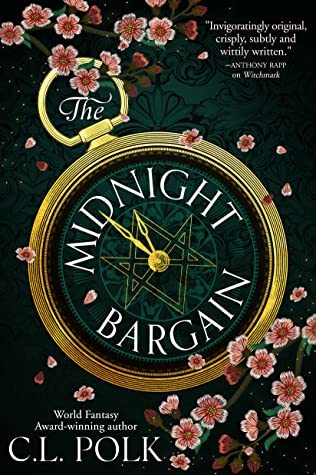
The Midnight Bargain by C.L. Polk
Representation: Secondary characters of colour, feminist themes, asexual-coded secondary character
Published by Erewhon on 13th October 2020
Genres: Fantasy
Goodreads

From the beloved World Fantasy Award-winning author of Witchmark comes a sweeping, romantic new fantasy set in a world reminiscent of Regency England, where women’s magic is taken from them when they marry. A sorceress must balance her desire to become the first great female magician against her duty to her family.
Beatrice Clayborn is a sorceress who practices magic in secret, terrified of the day she will be locked into a marital collar that will cut off her powers to protect her unborn children. She dreams of becoming a full-fledged Magus and pursuing magic as her calling as men do, but her family has staked everything to equip her for Bargaining Season, when young men and women of means descend upon the city to negotiate the best marriages. The Clayborns are in severe debt, and only she can save them, by securing an advantageous match before their creditors come calling.
In a stroke of luck, Beatrice finds a grimoire that contains the key to becoming a Magus, but before she can purchase it, a rival sorceress swindles the book right out of her hands. Beatrice summons a spirit to help her get it back, but her new ally exacts a price: Beatrice’s first kiss . . . with her adversary’s brother, the handsome, compassionate, and fabulously wealthy Ianthe Lavan.
The more Beatrice is entangled with the Lavan siblings, the harder her decision becomes: If she casts the spell to become a Magus, she will devastate her family and lose the only man to ever see her for who she is; but if she marries—even for love—she will sacrifice her magic, her identity, and her dreams. But how can she choose just one, knowing she will forever regret the path not taken?
So the thing is, I got my ARC (thank you Erewhon Books!), started reading…and had to stop on page four.
Not because it was bad! The exact opposite, actually.
I identified, empathised, with Beatrice so much, I couldn’t bear to read the scene I knew was coming. It’s not much of a spoiler; Beatrice finds a book she desperately wants, one that could change her life – but because of social rules, because she has to be Polite, she lets someone else take it instead. And reading that scene is agonising, not because the writing is bad – not even close! – but because I felt every instant of it as if I were the one in Beatrice’s shoes.
And really, that tells you the most important thing about Midnight Bargain right away: this is a book that you don’t read, you live. Beatrice is a protagonist you can’t help rooting for, but it’s so much more than that: you feel what she feels with an intensity that astounds. Her determination, her social awkwardness, her triumphs and pitfalls and the champagne-esque bubbles of joy; you’re not reading about them, you’re experiencing them all with her. It’s impossible not to make the comparison between the reader, and the spirits the sorcerers in the story deal with: spirits dwell in another realm, and are summoned into a sorcerer’s body so that they can experience a human’s senses.
With Midnight Bargain, the reader is the spirit, and the book the world of colour and texture and taste and emotion that almost overwhelms with its intensity.
Or flip it around; Polk’s writing is like one of the Greater Spirits, putting the reader in the position of sorcerer – once you let it inside you, nothing else can compare. Nothing can make you let the feeling of magic go.
I might have stopped at page four…but only for a few minutes.
Polk has crafted a story, cast, and world you can’t help but be ensnared by. Tiny, seemingly innocuous worldbuilding details (like brides being married in green!) are scattered throughout seemingly carelessly, but with all the skill of a jeweler placing gemstones where they’ll best shine (and you’d better keep track of them, because some build upon others into a mosaic the whole of which is only visible at the very end). These subtle details change the setting from something vaguely like Regency England into a place completely its own; even when I thought I recognised a trope, either in the setting or the story, it shimmered into a very different shape when I wasn’t looking, in beautifully clever ways. I absolutely loved those sneaky subversions!
Beatrice’s story, at its surface, looks familiar: she has to win a rich husband to save her family, despite not wanting to marry. She’s smart and sharp-tongued and socially awkward. She is a Fabulous Woman in a Patriarchy That Does Not Appreciate Her.
Okay; we know how this story goes, right?
Nope.
See, Beatrice is also a sorceress. But women aren’t allowed to use their magic in Chasland, Beatrice’s country. When they get married, their husbands put warding collars around their wives’ necks to cut them off from their magic.
Insert absolutely furious rage here.
But. Here’s the thing. Although it’s disgusting and awful and hugely unfair??? There’s actually a really good reason for it: if a sorceress gets pregnant, a spirit can enter the fetus before its born. This results in an incredibly dangerous ‘spiritborn’ child more than capable of burning down an entire city in a tantrum.
And that’s where Beatrice’s story really takes a sharp left turn from what I was expecting, because this…this is unusual. I’ve come across plenty of stories where The Patriarchy Sucks. But I can’t recall a single other example where The Patriarchy Sucks…But Also Has a Point. Is cutting a woman off from her magic fair? No! But what other option is there? Even other, more civilised countries, we learn, still use the warding collars – it’s just that their women only wear them while actually pregnant, not 24/7 for their entire lives.
Polk has changed the game. Of course you’re on Beatrice’s side, but… Well. But. And that – making the situation complicated, painting it in greys instead of keeping to a simple black and white – is one of the many things that makes Midnight Bargain really special. Although the book isn’t a ‘difficult’ read, with prose that draws you along and in and feels so easy and elegant, it’s by no means simple. And that tangles the reader’s emotions. It makes Beatrice’s world even more real, because it’s like ours: sometimes there aren’t easy answers, quick fixes. Sometimes things are unfair not because of evil, but to keep us safe.
…Right?
And this is all without weighing the very real straits Beatrice’s family are in, and her familial duties and responsibilities to them. Doesn’t she owe it to them to get married? To marry as well as she can? Isn’t that the only way she can save them?
…Maybe not.
Look: the blurb wants to convince you that this is a romance. And it kind of is, just like the Lavan siblings (the sister = the rival who steals Beatrice’s book; the brother = the most eligible, and wonderful, bachelor of Bargaining Season) do, indeed, tie Beatrice in knots and pull her in conflicting directions. But it’s nothing like that simple. Ianthe Lavan, Beatrice’s suitor and love interest, is so much more than a love interest. His and Beatrice’s relationship is so much more than a romance – or maybe it would be better to say, it’s the truest romance I’ve read in…maybe ever. And I kind of have to talk about Ianthe, because I’m so impressed with him as a character and with Polk for pulling him off so brilliantly. Ianthe starts the book believing he has enlightened views on women, because his country treats women much better than Beatrice’s. And that’s true! But. Better is not the same as good, and in enormous part because of his feelings for Beatrice, he starts to actually get that. Ianthe’s character arc is that of any well-off liberal who believes themselves to be an ally…then actually getting schooled by a member of an oppressed group, and listening. And learning. And doing better. In large part by realising that he can’t be the one who fixes everything; he can only support Beatrice, not save her.
She has to save herself, or it won’t mean anything.
I mean, by the end of the book I was in love with Ianthe, for crying out loud. What’s better: a picture-perfect hero, or someone who actually listens to you and takes you seriously and changes their mind and behaviour because of it? Because of you?
Who wouldn’t swoon?
Beatrice absolutely swoons. But Ianthe turning out to be even more wonderful than he originally seems is actually the opposite of helpful. Because she can have magic, or marriage, but she can’t have both. And where she only wanted one before – magic – now she does want both. And that just makes everything so much more painful.
Honestly, Beatrice and Ianthe’s conversations were some of my favourite parts of the book, because Polk articulates so well the issues of autonomy and why being allowed or given something isn’t the same as, or as good as, the thing being yours by right. So Ianthe would take the warding collar off when Beatrice wasn’t pregnant: so? That makes her magic into something he grants her, gives her, allows her. When it should be hers – is hers! Of course marriage with Ianthe would be much better than marrying a Chaslander, who would keep her in the collar all the time.
But better is not the same as good.
Polk plays your heartstrings like a master harpist with a harp, and it’s absolutely incredible. There’s no way not to rage at the unfairness of Beatrice’s situation, of the situation of all women in her world. There’s no way not to ache at the terrible choice she has to face. There’s no way not to chew your nails to the absolute quick as you turn the pages faster and faster, desperate for everything to end well even when you can’t figure out how it possibly could.
Look, this is an extremely long review (I HAVE FEELS, OKAY?) but you can basically sum the whole thing up by just imagining me screaming READ THIS BOOK at you.
So, you know.
READ THIS BOOK ALREADY!

The post Made of Magic: The Midnight Bargain by C.L. Polk appeared first on Every Book a Doorway.
October 12, 2020
Must-Have Monday #20!
It’s been a little quiet around here lately; my sincere apologies for that! There’ve been some health issues, and much more importantly, our household is going to be adopting two kittens! Star is blind and Galaxy can only see out of one eye, so there’s plenty of catification to do to the apartment.
Anyway, let’s get on to what you’re here for – THIS WEEK’S BOOKS! So many of the books I’ve been waiting for all year (some for multiple years) are finally here!!!
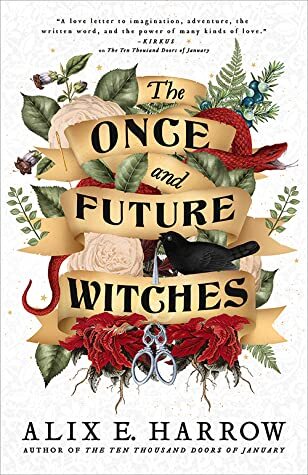
The Once and Future Witches by Alix E. Harrow
Representation: Possibly asexual MC, F/F relationship, characters of colour, trans character
on 13th October 2020
Genres: Fantasy
Goodreads
In 1893, there's no such thing as witches. There used to be, in the wild, dark days before the burnings began, but now witching is nothing but tidy charms and nursery rhymes. If the modern woman wants any measure of power, she must find it at the ballot box.
But when the Eastwood sisters--James Juniper, Agnes Amaranth, and Beatrice Belladonna--join the suffragists of New Salem, they begin to pursue the forgotten words and ways that might turn the women's movement into the witch's movement. Stalked by shadows and sickness, hunted by forces who will not suffer a witch to vote-and perhaps not even to live-the sisters will need to delve into the oldest magics, draw new alliances, and heal the bond between them if they want to survive.
There's no such thing as witches. But there will be.
Pretty much the second I finished reading The Ten Thousand Doors of January, I was online trying to find everything else Alix E. Harrow has ever written. At the time, there were some seriously beautiful short stories for me to read – but you can imagine my joy when I heard about her next book. And it sounds so freaking amazing!!! This is like everything I ever wanted in a single book. If you haven’t yet, you should definitely read the short story The Sycamore and the Sybil, which is set in the same universe! (Though it stands alone perfectly well, and doesn’t include any spoilers for the novel!)
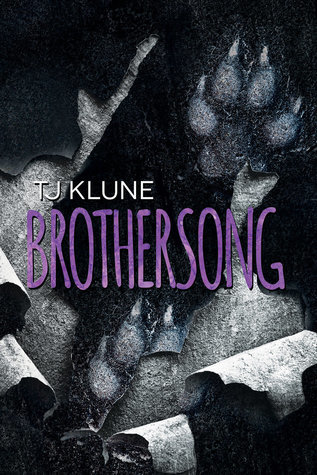
Brothersong (Green Creek, #4) by T.J. Klune
Representation: Queer cast, M/M or mlm
on 13th October 2020
Genres: Queer Protagonists, Urban Fantasy
Goodreads
In the ruins of Caswell, Maine, Carter Bennett learned the truth of what had been right in front of him the entire time. And then it—he—was gone.
Desperate for answers, Carter takes to the road, leaving family and the safety of his pack behind, all in the name of a man he only knows as a feral wolf. But therein lies the danger: wolves are pack animals, and the longer Carter is on his own, the more his mind slips toward the endless void of Omega insanity.
But he pushes on, following the trail left by Gavin.
Gavin, the son of Robert Livingstone. The half-brother of Gordo Livingstone.
What Carter finds will change the course of the wolves forever. Because Gavin’s history with the Bennett pack goes back further than anyone knows, a secret kept hidden by Carter’s father, Thomas Bennett.
And with this knowledge comes a price: the sins of the fathers now rest upon the shoulders of their sons.
It seems like everyone who knows Klune is aware that this is the week the Green Creek series finally comes to an end. And…literally no one is ready. I know I’m not; I meant to reread the earlier books in time for this release, and I haven’t managed it. I DON’T WANT THIS SERIES TO BE OVER! But at the same time, I desperately want it to be over, and for everyone to get the happy ending they deserve!
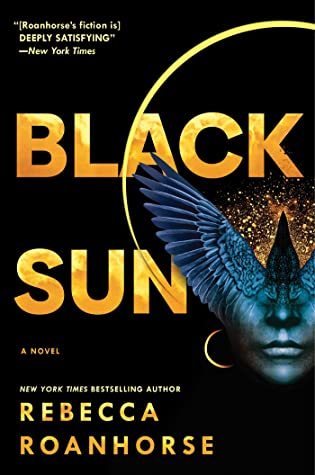
Black Sun (Between Earth and Sky, #1) by Rebecca Roanhorse
Representation: Indigenous Cast, queer cast (bisexual + trans)
on 13th October 2020
Genres: Fantasy
Goodreads
A god will return
When the earth and sky converge
Under the black sun
In the holy city of Tova, the winter solstice is usually a time for celebration and renewal, but this year it coincides with a solar eclipse, a rare celestial event proscribed by the Sun Priest as an unbalancing of the world.
Meanwhile, a ship launches from a distant city bound for Tova and set to arrive on the solstice. The captain of the ship, Xiala, is a disgraced Teek whose song can calm the waters around her as easily as it can warp a man’s mind. Her ship carries one passenger. Described as harmless, the passenger, Serapio, is a young man, blind, scarred, and cloaked in destiny. As Xiala well knows, when a man is described as harmless, he usually ends up being a villain.
Crafted with unforgettable characters, Rebecca Roanhorse has created an epic adventure exploring the decadence of power amidst the weight of history and the struggle of individuals swimming against the confines of society and their broken pasts in the most original series debut of the decade.
I have been waiting for Black Sun since it was just an announcement of a publishing deal. THIS IS ALSO EVERYTHING I HAVE EVER WANTED IN A SINGLE BOOK! (Isn’t it amazing how everything you ever wanted can look so different in the hands of different storytellers???)

The Midnight Bargain by C.L. Polk
Representation: Love interest + secondary character of colour, possibly asexual secondary character
on 13th October 2020
Genres: Fantasy
Goodreads
From the beloved World Fantasy Award-winning author of Witchmark comes a sweeping, romantic new fantasy set in a world reminiscent of Regency England, where women’s magic is taken from them when they marry. A sorceress must balance her desire to become the first great female magician against her duty to her family.
Beatrice Clayborn is a sorceress who practices magic in secret, terrified of the day she will be locked into a marital collar that will cut off her powers to protect her unborn children. She dreams of becoming a full-fledged Magus and pursuing magic as her calling as men do, but her family has staked everything to equip her for Bargaining Season, when young men and women of means descend upon the city to negotiate the best marriages. The Clayborns are in severe debt, and only she can save them, by securing an advantageous match before their creditors come calling.
In a stroke of luck, Beatrice finds a grimoire that contains the key to becoming a Magus, but before she can purchase it, a rival sorceress swindles the book right out of her hands. Beatrice summons a spirit to help her get it back, but her new ally exacts a price: Beatrice’s first kiss . . . with her adversary’s brother, the handsome, compassionate, and fabulously wealthy Ianthe Lavan.
The more Beatrice is entangled with the Lavan siblings, the harder her decision becomes: If she casts the spell to become a Magus, she will devastate her family and lose the only man to ever see her for who she is; but if she marries—even for love—she will sacrifice her magic, her identity, and her dreams. But how can she choose just one, knowing she will forever regret the path not taken?
I was lucky enough to get an ARC of this one (my review will be up soon!) and. Just. It’s so mindblowingly wonderful and gutwrenching and gorgeous. I love it so much more than I loved Witchmark! I know for a fact y’all aren’t ready.
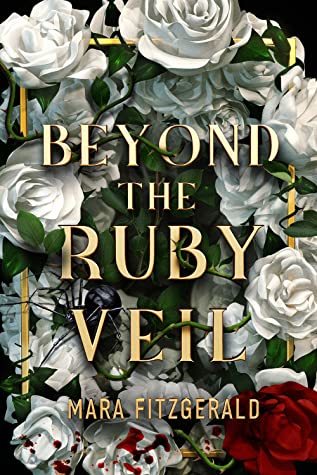
Beyond the Ruby Veil (Beyond the Ruby Veil, #1) by Mara Fitzgerald
Representation: Lesbian MC, F/F or wlw
on 13th October 2020
Genres: Secondary World Fantasy
Goodreads
A dark, queer YA fantasy that's perfect for fans of the Three Dark Crowns series and Wicked Saints. After Emanuela Ragno kills the one person in Occhia who can create water, she must find a way to save her city from dying of thirst.
Emanuela Ragno always gets what she wants. With her daring mind and socialite schemes, she refuses to be the demure young lady everyone wants her to be. In her most ambitious move yet, she's about to marry Alessandro Morandi, her childhood best friend and the heir to the wealthiest house in Occhia. Emanuela doesn't care that she and her groom are both gay, because she doesn't want a love match. She wants power, and through Ale, she'll have it all.
But Emanuela has a secret that could shatter her plans. In the city of Occhia, the only source of water is the watercrea, a mysterious being who uses magic to make water from blood. When their first bruise-like omen appears on their skin, all Occhians must surrender themselves to the watercrea to be drained of life. Everyone throughout history has given themselves up for the greater good. Everyone except Emanuela. She's kept the tiny omen on her hip out of sight for years.
When the watercrea exposes Emanuela during her wedding ceremony and takes her to be sacrificed, Emanuela fights back...and kills her. Now Occhia has no one to make their water and no idea how to get more. In a race against time, Emanuela and Ale must travel through the mysterious, blood-red veil that surrounds their city to uncover the secrets of the watercrea's magic and find a way to save their people-no matter what it takes.
HERE IS ANOTHER BOOK I HAVE BEEN WAITING YEARS FOR! I first found a mention of it on Goodreads, long before there was a cover or a proper synopsis, and I’ve been dying to read it ever since. LESS THAN 12 HOURS NOW!

The Lost Shtetl by Max Gross
Representation: Jewish MC + cast
on 13th October 2020
Goodreads
A remarkable debut novel—written with the fearless imagination of Michael Chabon and the piercing humor of Gary Shteyngart—about a small Jewish village in the Polish forest that is so secluded no one knows it exists . . . until now.
What if there was a town that history missed?For decades, the tiny Jewish shtetl of Kreskol existed in happy isolation, virtually untouched and unchanged. Spared by the Holocaust and the Cold War, its residents enjoyed remarkable peace. It missed out on cars, and electricity, and the internet, and indoor plumbing. But when a marriage dispute spins out of control, the whole town comes crashing into the twenty-first century.
Pesha Lindauer, who has just suffered an ugly, acrimonious divorce, suddenly disappears. A day later, her husband goes after her, setting off a panic among the town elders. They send a woefully unprepared outcast named Yankel Lewinkopf out into the wider world to alert the Polish authorities.
Venturing beyond the remote safety of Kreskol, Yankel is confronted by the beauty and the ravages of the modern-day outside world – and his reception is met with a confusing mix of disbelief, condescension, and unexpected kindness. When the truth eventually surfaces, his story and the existence of Kreskol make headlines nationwide.
Returning Yankel to Kreskol, the Polish government plans to reintegrate the town that time forgot. Yet in doing so, the devious origins of its disappearance come to the light. And what has become of the mystery of Pesha and her former husband? Divided between those embracing change and those clinging to its old world ways, the people of Kreskol will have to find a way to come together . . . or risk their village disappearing for good.
I only learned about this one today (thanks to Evelina’s review over at Avalinah’s Books!) but it sounds utterly fabulous and I’m eager to read it!
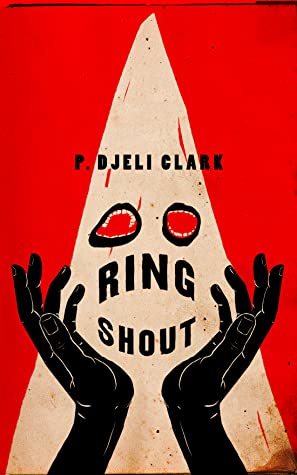
Ring Shout by P. Djèlí Clark
Representation: Black MC
on 13th October 2020
Genres: Fantasy
Goodreads
Nebula, Locus, and Alex Award-winner P. Djèlí Clark returns with Ring Shout, a dark fantasy historical novella that gives a supernatural twist to the Ku Klux Klan's reign of terror.
D. W. Griffith is a sorcerer, and The Birth of a Nation is a spell that drew upon the darkest thoughts and wishes from the heart of America. Now, rising in power and prominence, the Klan has a plot to unleash Hell on Earth.
Luckily, Maryse Boudreaux has a magic sword and a head full of tales. When she's not running bootleg whiskey through Prohibition Georgia, she's fighting monsters she calls "Ku Kluxes." She's damn good at it, too. But to confront this ongoing evil, she must journey between worlds to face nightmares made flesh--and her own demons. Together with a foul-mouthed sharpshooter and a Harlem Hellfighter, Maryse sets out to save a world from the hate that would consume it.
It’s excellent timing for this to be released while Lovecraft Country is running; did someone coordinate that? Regardless, this sounds amazing, and like it’s going to be the same kind of deeply uncomfortable read that we (meaning white people) need.
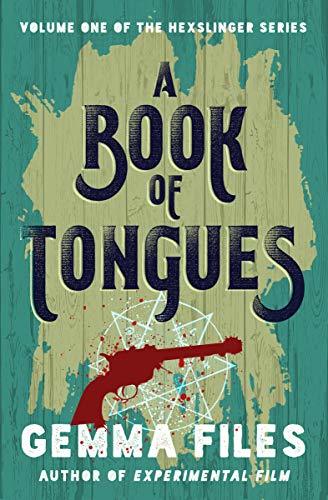
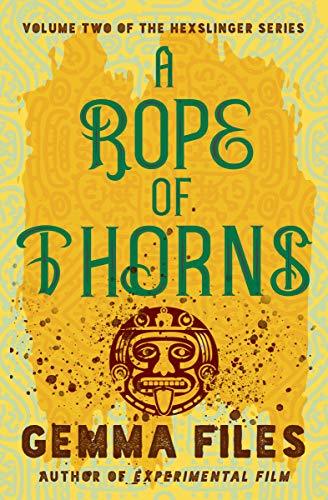
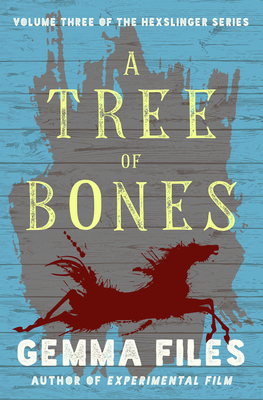
A Book of Tongues (The Hexslinger Series) by Gemma Files
Representation: Gay MCs, M/M or mlm
on 13th October 2020
Genres: Fantasy, Queer Protagonists
Goodreads
Two years after the Civil War, Pinkerton agent Ed Morrow has gone undercover with one of the weird West's most dangerous outlaw gangs-the troop led by "Reverend" Asher Rook, ex-Confederate chaplain turned "hexslinger," and his notorious lieutenant (and lover) Chess Pargeter. Morrow's task: get close enough to map the extent of Rook's power, then bring that knowledge back to help Professor Joachim Asbury unlock the secrets of magic itself.
Magicians, cursed by their gift to a solitary and painful existence, have never been more than a footnote in history. But Rook, driven by desperation, has a plan to shatter the natural law that prevents hexes from cooperation, and change the face of the world-a plan sealed by an unholy marriage-oath with the goddess Ixchel, mother of all hanged men. To accomplish this, he must raise her bloodthirsty pantheon from its collective grave through sacrifice, destruction, and apotheosis.
Caught between a passel of dead gods and monsters, hexes galore, Rook's witchery, and the ruthless calculations of his own masters, Morrow's only real hope of survival lies with the man without whom Rook cannot succeed: Chess Pargeter himself. But Morrow and Chess will have to literally ride through Hell before the truth of Chess's fate comes clear-the doom written for him, and the entire world.
The Hexslinger trilogy was originally published a while back – I read these in 2011! – but they’re being republished with fabulous new covers! Take a Western setting, make it queer as in fuck you, and add Aztec mythology: boom, you have the Hexslinger books! The Aztec element does add some pretty horrible gore at times, but damn, these are brilliant and fun, and this is a brilliant opportunity to read them if you haven’t yet – all three of them are being re-released tomorrow!
ARE YOU READY? BECAUSE I AM SO NOT READY.
TOMORROW IS GOING TO BE SO GOOD, FOLX. SO, SO GOOD!
The post Must-Have Monday #20! appeared first on Every Book a Doorway.
October 6, 2020
Oz’s Got Nothing on This: Over the Woodward Wall by A. Deborah Baker
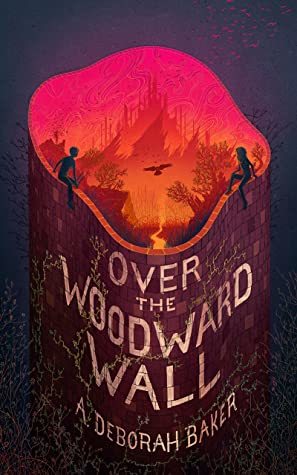
Over the Woodward Wall by A. Deborah Baker
on 6th October 2020
Goodreads

"Writing as A. Deborah Baker, New York Times bestselling and award-winning author Seanan McGuire introduces readers to a world of talking trees and sarcastic owls, of dangerous mermaids and captivating queens in Over the Woodward Wall, an exceptional tale for readers who are young at heart.
If you trust her you’ll never make it home…
Avery is an exceptional child. Everything he does is precise, from the way he washes his face in the morning, to the way he completes his homework – without complaint, without fuss, without prompt.
Zib is also an exceptional child, because all children are, in their own way. But where everything Avery does and is can be measured, nothing Zib does can possibly be predicted, except for the fact that she can always be relied upon to be unpredictable.
They live on the same street.They live in different worlds.
On an unplanned detour from home to school one morning, Avery and Zib find themselves climbing over a stone wall into the Up and Under – an impossible land filled with mystery, adventure and the strangest creatures.
And they must find themselves and each other if they are to also find their way out and back to their own lives."
The first thing you should probably know is that Over the Woodward Wall began its existence as that most magical of things – a book inside another book. In Seanan McGuire’s Middlegame, Over the Woodward Wall is the name of book written by a genius alchemist to sneakily teach the principles of alchemy to the world’s children.
More or less.
With Middlegame gaining a huge amount of acclaim, someone was smart enough to ask McGuire if she’d also like to write Over the Woodward Wall. And, using the pseudonym her fictional alchemist used, she did!
In Over the Woodward Wall, two perfectly normal children, Zib and Avery, encounter a wall on their way to school – a wall that shouldn’t be there. And for different reasons, they climb over it.
When they drop down on the other side, they’re not in our world any more. And the wall has disappeared behind them, leaving them stranded in a place called the Up-and-Under. How to get home? And do both of them even want to?
It’s impossible not to draw comparisons between Over the Woodward Wall and The Wizard of Oz, simply because both books feature an all-important road that the main characters must follow to their destination. But it’s not a fair comparison, because the road of Over the Woodward Wall is not like other roads – just like this book isn’t like other books. Instead of a yellow brick road leading to a wizard who isn’t, the improbable road is…well, I’ll let one of the inhabitants of the Up-and-Under explain it;
“Bricks made from sunlight on sand and moonlight on mist and starlight on water? Improbable! A single road that runs the length of an entire kingdom? Improbable! A city of untold marvels and incredible wonders waiting at its end? Improbable! So this, then, must be the improbable road, and if you walk it long enough, all your questions will be answered, for what could be more improbable than a happy ending?”
It’s to the Impossible City that Zib and Avery need to go if they want to go home – or even if they don’t. And off they go.
Over the Woodward Wall is full of McGuire’s signature wry humour and wisdom; there’s something in the tone of it that’s reminiscent of her Wayward Children series (and maybe that’s only to be expected, since both feature a set of wayward children. I wonder what Door would open for Avery, if he got a Door instead of a Wall? I’m willing to bet Zib, at least, would get a Nonsense Door.) But if the Wayward Children books are written for adults who remember being younger (and who haven’t quite given up on their Doors), Over the Woodward Wall very much belongs to actual children – whether that means people who are still children by number of years lived, or the inner child inside the most grown of grown-ups. This book is for either or both.
“Not knowing things means you have room to learn, and leaning’s about the most important thing there is, so the more ignorant you are, the more important you can be.”
Like all the best writers, McGuire doesn’t talk down to her audience. And like the very best writers, she doesn’t try to simplify or prettify things for younger readers. It’s as Madeleine L’Engle said: “You have to write the book that wants to be written. And if the book will be too difficult for grown-ups, then you write it for children.” There’s an extra layer to this if you’ve already read Middlegame, and know that Over the Woodward Wall is meant to be spreading the secrets of the universe at the feet of children. But even without that aspect of it, there’s plenty of pointed reminders and lessons here for children and grown-ups alike.
“Some monsters speak, child,” said the beast. “The very best monsters speak like kings and queens, eloquent and alluring, and the trick is learning not to listen. If you listen to those monsters, they’ll have your heart out before you realize how much danger you’re in.”
Which is not to say, at all, that Over the Woodward Wall is just a 200+ page book of morals or something. It’s strange and wonderful and there’s a lot of laughter mixed into the bittersweet, just as there’s a perfect balance struck between whimsy and a special kind of terrifying.
“Everything with wings is a coward,” said the Crow Girl. “Even the things that want to be brave, the hawks and eagles and vultures and pelicans, they’re all cowards. To have wings is to know how to fly away.” She paused before adding, thoughtfully, “Maybe emus aren’t cowards. They have wings, but they’ve forgotten how to fly. Maybe they can learn to be brave.”
You don’t, at all, have to have read Middlegame to appreciate Over the Woodward Wall – it stands alone on its own two feet without any need for bulwarks, and should be judged for itself, not for its connection to Middlegame. Even if those who’ve read both will see plenty of connections between the themes, and even the characters, of both books, I don’t really think Middlegame will help readers understand Over the Woodward Wall. For that, you need to study this book as if every motif in it is as deeply meaningful as I’m sure it is; you need to read each page twice, and maybe three times, and think about what you’ve read.
I mean, you can also just read it as a fun story! Because it is that, and it doesn’t have to be more than that if you don’t want it to.
But you can also ponder the symbolism of the King of Cups and Queen of Wands – figures originally from the tarot, but given new layers of meaning here. You can think over the power of names, and nicknames, and screams. If you’re an adult, maybe you’ll be reminded that children are people too, and to treat them as if they are. There’s different kinds of bravery, and different ways to be good, and no one can live up to all of them all of the time.
Sometimes anger is a good, true thing, because the world is so often unfair, and unfairness deserves to be acknowledged. But all too often, anger is another feeling in its Sunday clothes, sadness or envy or–most dangerous of all–fear.
Over the Woodward Wall might have started its existence as a secret alchemical primer within another book, but it packs a hell of a lot more punch than that now. It’s McGuire whispering the secrets of life, the universe, and everything in your ear, guiding you along the shining improbable road to your own Impossible City.
“Frightened means you’ve the sense to be afraid, and it’s cowards who get things done, more often than not.”
The only way to reach the Impossible City is to walk the improbable road. So pick up this book and get walking. How else are you going to get there?

The post Oz’s Got Nothing on This: Over the Woodward Wall by A. Deborah Baker appeared first on Every Book a Doorway.
September 18, 2020
In Music Our Memory: The Chimes by Anna Smaill
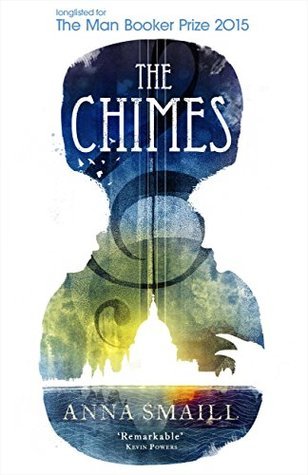
The Chimes by Anna Smaill
Representation: M/M
on 12th February 2015
Genres: Fantasy, Queer Protagonists, Sci Fi, Science Fantasy
Goodreads

The Chimes is set in a reimagined London, in a world where people cannot form new memories, and the written word has been forbidden and destroyed.
In the absence of both memory and writing is music.
In a world where the past is a mystery, each new day feels the same as the last, and before is blasphony, all appears lost. But Simon Wythern, a young man who arrives in London seeking the truth about what really happened to his parents, discovers he has a gift that could change all of this forever.
A stunning literary debut by poet and violinist Anna Smaill, The Chimes is a startlingly original work that combines beautiful, inventive prose with incredible imagination.
It’s quite probable that you’ve never heard of Anna Smaill, or her debut The Chimes. I consider myself well-read, and especially well-read in weird, beautiful books no one else has ever heard of, but I stumbled across The Chimes completely by accident, years after it had been published. I have a spiderweb spread across dozens of sources, but The Chimes never brushed against a single one of my threads.
And that is appalling, because this is an incredible book that deserves so much attention!
That said, I do understand why it might not have made the bestseller lists – it’s a book you have to devote yourself to. This is no simple, breezy adventure story, but a complex imagining of a future world, written using a great deal of technical musical terms, and told via an unreliable narrator – unreliable because, in the world of The Chimes, humans can no longer form memories easily. And what’s a narrator who can’t remember his own story?
The thing is though, if you do give this book your full attention? If you’re willing to give it the focus required? Then it unfolds into page after page of treasures, breathtakingly original and incredibly beautiful.
To say Chimes is lyrically written is like saying the ocean is wet. It’s only barely a metaphor to say that this book makes music as you read.
Okay, so it’s technically incredible. How about the story?
The book opens with Simon, the unreliable narrator I mentioned above, waiting with a bag full of objectmemories – literally, objects to which specific memories are anchored, the only way people can keep memories now. When he’s picked up by a passing trader’s cart, he makes his way to London. He has his bag, and a song – a tune, really.
He’s looking for someone.
At first it’s just the shouts and calls of song from traders. Then there are driving bursts of melody from highboy, viol, clarionet. We trot in past blankfaced buildings with hollow windows and buckled mettle and narrow cobbled streets. Music spills from the living quarters above shops, spins up from groups of musicians standing in door frames. Trompets send out brassy martial calls along the roof turrets. Viols speak with voices high and yearning and full of ache like human song. And under it all is the hard horsehoof beat of tambors. It grows and grows in a vast crescendo.
The tune leads him where it’s supposed to lead him…but the door there is closed. And in a city that’s full of music and song, Simon is drawn towards the one source of silence – a mysterious metal, hunted for by the gangs of homeless teenagers who live by the river. They call the metal the Lady, and sell it to the Order – the group of musicians/scholars/bureaucrats/priests who run the country.
And the Order? Uses it for the Carillion – the enormous instrument that, multiple times a day, plays music which reaches right into the minds and hearts of every citizen.
It’s a loud song.
Simon is adopted into the Five Rover pact, a group of teens run by the blind Lucien, when he proves to have a talent for ‘hearing’ the Lady. And with nowhere else to go, Simon stays.
But he has questions. Questions about his own memories. About things he doesn’t remember. And Lucien just might have answers – not only about Simon’s memories, but about the very nature of human memories – and why humans can’t keep them anymore.
This is a dystopia like no other, every word a note in an unbelievable melody, unfolding page by page into something incredibly unique and truly special. And although Simon does have a special gift, as mentioned in the book description, this isn’t a chosen one story where one person can save the day. It’s much more complicated than that – even if two boys might be the key to kickstarting devastating change.
Smaill doesn’t talk down to the reader; Chimes is all show and no tell. But what it shows you is incomparably gorgeous and strange, and even if this book requires you to hit the ground running in terms of being dropped into this unfamiliar world, you’ll find yourself turning the pages faster and faster as the music pulls you under and sweeps you away.
I love it dearly. I think, if you give it a chance, you will too.

The post In Music Our Memory: The Chimes by Anna Smaill appeared first on Every Book a Doorway.
September 15, 2020
Magic is Here, Queer, and Ready to Fuck You Up: The Scapegracers by Hannah Abigail Clarke
Representation: Lesbian MC, queer main characters, characters of colour, secondary gay characters, wlw or F/F, mlm or M/M
on 15th September 2020
Genres: Urban Fantasy, Queer Protagonists
Goodreads

An outcast teenage lesbian witch finds her coven hidden amongst the popular girls in her school, and performs some seriously badass magic in the process.
Skulking near the bottom of West High’s social pyramid, Sideways Pike lurks under the bleachers doing magic tricks for Coke bottles. As a witch, lesbian, and lifelong outsider, she’s had a hard time making friends. But when the three most popular girls pay her $40 to cast a spell at their Halloween party, Sideways gets swept into a new clique. The unholy trinity are dangerous angels, sugar-coated rattlesnakes, and now–unbelievably–Sideways’ best friends.
Together, the four bond to form a ferocious and powerful coven. They plan parties, cast curses on dudebros, try to find Sideways a girlfriend, and elude the fundamentalist witch hunters hellbent stealing their magic. But for Sideways, the hardest part is the whole ‘having friends’ thing. Who knew that balancing human interaction with supernatural peril could be so complicated?
Rich with the urgency of feral youth, The Scapegracers explores growing up and complex female friendship with all the rage of a teenage girl. It subverts the trope of competitive mean girls and instead portrays a mercilessly supportive clique of diverse and vivid characters. It is an atmospheric, voice-driven novel of the occult, and the first of a three-book series.
This isn’t a book. It’s a howl. It’s a roar. It’s a spell screamed at the sky. It’s fierce and bold and beautiful, it’s ancient magics rewritten in neon lights, it’s bared teeth and a middle finger, it’s lipstick smiles sharp as scythes, it’s a lit fuse, it’s living fire. It’s a war-cry. It’s shrieks of laughter. It’s the wild, feral joy that makes the hairs on your arms stand up and your blood pound.
This isn’t a book.
It’s something else.
Open Scapegracers, and you start the ritual. Every word is a sigil drawn directly on your mind; every page is another step in the spell. Reading becomes an act of power, witchcraft, charged and electric; you’re casting the enchantment on yourself each time you turn the page.
By the time you reach the end, gravity will be for other people.
*
What draws you into Scapegracers, first, is the beautiful prose. It’s lyrical, wild, raw, exquisite, a siren-song remixed for the modern age. The words get under your skin, catch in your eyelashes, spiral inside your head. Every other sentence is a nod from Hannah Abigail Clarke directly to the reader, a potent potion of truth that hits you low in your gut; true things that you’ve never been able to put into words, or that you’ve never heard anyone else think or say, flow through these pages like poetry.
“We’re inviting the liquid night, the molten magic. We’re inviting the star-spiked darkness inside and calling it to this circle. Flow through us and spill. All this dancing is in triumph and our booze is all libations. We’ve brought you beats and lights and glamour, we brought fresh meat, new blood, and booze, and in return, we want some chaos. We want havoc. Bring us hell.”
I want to push this book into the hands of every teenage girl, and everyone who has ever been a teenage girl, and everyone who has ever thought for even one second that teenage girls are things to mock or dismiss or objectify.
Clarke gets it.
I was not alone. In this space, in the presence of these sacred things, I felt witnessed and genuinely understood. I felt it marrow deep. It made me want to cry, or maybe crash my fists into something over and over again until it was dead.
The real, hardcore action takes a little while to get going. That’s fine. Because that’s just the cinematic stuff. The magic starts from the opening line and doesn’t let up for a second.
Wind picked up and tossed our hair, and it felt like celestial validation, like the entire night was primed for whatever I was going to do. Wreak havoc, said Nature. Raise hell. Our hands vibrated where they touched. This didn’t feel like a liquor-dusted parlor trick; this was ancient, opulent, invincible. It was the realest thing in the world.
Sideways is a witch, and I can only assume Clarke is too, because I’ve never read a book that so completely and perfectly captures what it’s like to be a witch and work real magic. Or, for that matter, what it’s like to be a teenager, feral and wary and wanting to belong.
That’s where Yates, Daisy, and Jing come in.
they were dangerous angels, sugar-coated rattlesnakes, the kind of girls who everybody adored
And once they see Sideways’ magic, they want in. They want her. Not to use her or possess her, but to join their sisterhood. To make their coven.
They’d look at us like we were teenage Erinyes.
(For the record? Erinyes are better known as the Furies from Greek mythology. Clarke’s writing isn’t pretentious, but Scapegracers doesn’t talk down to you, either. Or slow down. You want the magic, you need to keep up. You need to want it.
Which is my way of letting you know that lines like this, references like this, are scattered throughout, and each one is a dark and delicious surprise. ‘It was bleaker than Nietzsche on the staircase’? *chef’s kiss*)
And that’s just what the four of them do: form a coven. Form a sisterhood. Scapegracers is all about sisters, girlhood, femininity, friendship. It’s about being stronger together. It’s about the wildness that waits under the most ribbon-bedecked girls, about nails shining with sparkly polish still being sharp as claws. Scapegracers does not sneer at or demonise girls who like pink any more than it turns its nose up at girls who like leather jackets. There’s countless ways to be a girl, and they’re all valid, and they’re all powerful.
Scapegracers is a manifesto, and its message is this: Girls are magic.
“I guess my point is that teenage girls aren’t supposed to be powerful, you know? Everybody hates teenage girls. They hate our bodies and hate us if we want to change them. They hate the things we’re supposed to like but hate it when we like other things even more, because that means we’re ruining their things. We’re somehow this great corrupting influence, even though we’ve barely got any legal agency of our own. But the three of us – the four of us, counting you – we’re powerful. Maybe not in the ways that people are supposed to be, maybe in ways that people think are scary or hard to understand, but we are. Magic is ambiguous. It’s scary and flashy and everybody wants it and it really freaks people out. I guess it fits with the rest.”
It’s also a celebration of queerness, and draws a beautiful parallel between the queer experience and the witch experience. You don’t have to be queer to be magic, but you are magic if you’re queer.
There is action. There are mysteries. There are wonders to be discovered and miracles to be made. There’s a patriarchy to burn down and neon myths to tell. But I’m not going to tell you what they are. What would be the point of that? You need to read them for yourself.
You need to work magic to understand it.
2020 has been the year of the Queer Witch. We’ve been absolutely spoiled for choice, from Witches of Ash and Ruin and When We Were Magic, to Elysium Girls and This Coven Won’t Break – and, of course, the breathtaking Dark Tide.
Widen your definition of ‘witch’ a little and we also have Storm of Life, The Fascinators, Harrow the Ninth, and Cemetery Boys, all featuring queer magic users of one stripe or another. I could wrangle another dozen entries to the list from books I know of, and I’m sure there’s more that somehow escaped my notice.
But it doesn’t matter how many there are. A Queendom has only two monarchs, and Dark Tide claims one crown – but Scapegracers takes the other.
Then snaps it in half, tosses the pieces aside, and gives you the finger, laughing, for thinking it wants or needs validation from anyone.
Scapegracers doesn’t need you to love it. It dares you not to.

The post Magic is Here, Queer, and Ready to Fuck You Up: The Scapegracers by Hannah Abigail Clarke appeared first on Every Book a Doorway.
September 14, 2020
Must-Have Monday #19!
I’m only aware of four spec-fic releases this week, but wow does this list pack a punch! Not gonna lie; I’ve spent all year waiting for these!!!

The Scapegracers (Scapegracers, #1) by Hannah Abigail Clarke
Representation: Lesbian MC, Characters of Colour, queer cast, F/F or wlw
on 15th September 2020
Genres: Urban Fantasy, Queer Protagonists
Goodreads
An outcast teenage lesbian witch finds her coven hidden amongst the popular girls in her school, and performs some seriously badass magic in the process.
Skulking near the bottom of West High’s social pyramid, Sideways Pike lurks under the bleachers doing magic tricks for Coke bottles. As a witch, lesbian, and lifelong outsider, she’s had a hard time making friends. But when the three most popular girls pay her $40 to cast a spell at their Halloween party, Sideways gets swept into a new clique. The unholy trinity are dangerous angels, sugar-coated rattlesnakes, and now–unbelievably–Sideways’ best friends.
Together, the four bond to form a ferocious and powerful coven. They plan parties, cast curses on dudebros, try to find Sideways a girlfriend, and elude the fundamentalist witch hunters hellbent stealing their magic. But for Sideways, the hardest part is the whole ‘having friends’ thing. Who knew that balancing human interaction with supernatural peril could be so complicated?
Rich with the urgency of feral youth, The Scapegracers explores growing up and complex female friendship with all the rage of a teenage girl. It subverts the trope of competitive mean girls and instead portrays a mercilessly supportive clique of diverse and vivid characters. It is an atmospheric, voice-driven novel of the occult, and the first of a three-book series.
We’ve had so many queer witchy books this year, but Scapegracers blows the rest of them out of the water. (Except Dark Tide. Dark Tide shares the top spot.) It’s fierce neon magic and girls baring their teeth and an absolute feast of decadent writing, and I am flat-out ordering you to read it!
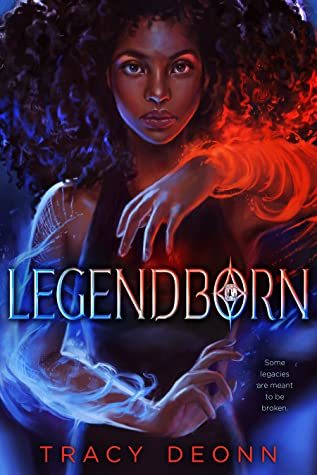
Legendborn (Legendborn, #1) by Tracy Deonn
Representation: Bisexual MC of Colour, Lesbian, Nonbinary, F/F or wlw, M/M or mlm
on 15th September 2020
Genres: Urban Fantasy, Queer Protagonists
Goodreads
Filled with mystery and an intriguingly rich magic system, Tracy Deonn’s YA contemporary fantasy Legendborn offers the dark allure of City of Bones with a modern-day twist on a classic legend and a lot of Southern Black Girl Magic.
After her mother dies in an accident, sixteen-year-old Bree Matthews wants nothing to do with her family memories or childhood home. A residential program for bright high schoolers at UNC–Chapel Hill seems like the perfect escape—until Bree witnesses a magical attack her very first night on campus.
A flying demon feeding on human energies.
A secret society of so called “Legendborn” students that hunt the creatures down.
And a mysterious teenage mage who calls himself a “Merlin” and who attempts—and fails—to wipe Bree’s memory of everything she saw.
The mage’s failure unlocks Bree’s own unique magic and a buried memory with a hidden connection: the night her mother died, another Merlin was at the hospital. Now that Bree knows there’s more to her mother’s death than what’s on the police report, she’ll do whatever it takes to find out the truth, even if that means infiltrating the Legendborn as one of their initiates.
She recruits Nick, a self-exiled Legendborn with his own grudge against the group, and their reluctant partnership pulls them deeper into the society’s secrets—and closer to each other. But when the Legendborn reveal themselves as the descendants of King Arthur’s knights and explain that a magical war is coming, Bree has to decide how far she’ll go for the truth and whether she should use her magic to take the society down—or join the fight.
Black girls taking out the patriarchy – taking out the entire mythology of the patriarchy. I am so here for this!!!
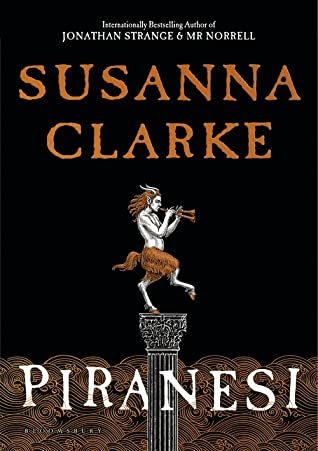
Piranesi by Susanna Clarke
on 15th September 2020
Genres: Historical Fantasy
Goodreads
From the New York Times bestselling author of Jonathan Strange & Mr Norrell, an intoxicating, hypnotic new novel set in a dreamlike alternative reality.
Piranesi's house is no ordinary building: its rooms are infinite, its corridors endless, its walls are lined with thousands upon thousands of statues, each one different from all the others. Within the labyrinth of halls an ocean is imprisoned; waves thunder up staircases, rooms are flooded in an instant. But Piranesi is not afraid; he understands the tides as he understands the pattern of the labyrinth itself. He lives to explore the house.
There is one other person in the house-a man called The Other, who visits Piranesi twice a week and asks for help with research into A Great and Secret Knowledge. But as Piranesi explores, evidence emerges of another person, and a terrible truth begins to unravel, revealing a world beyond the one Piranesi has always known.
For readers of Neil Gaiman's The Ocean at the End of the Lane and fans of Madeline Miller's Circe, Piranesi introduces an astonishing new world, an infinite labyrinth, full of startling images and surreal beauty, haunted by the tides and the clouds.
I know almost nothing about this book beyond the description, but it’s Susanna Clarke, so of course I’m going to dive right in!
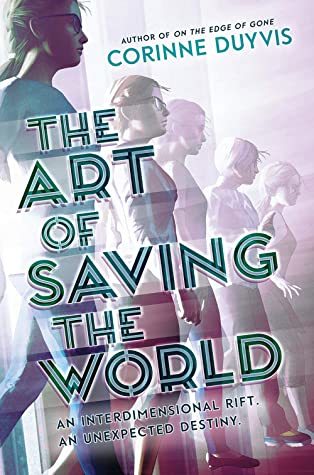
The Art of Saving the World by Corinne Duyvis
Representation: Queer Cast, Lesbian, Asexual
on 15th September 2020
Genres: Urban Fantasy, Queer Protagonists
Goodreads
One girl and her doppelgangers try to stop the end of the world in this YA sci-fi adventure
When Hazel Stanczak was born, an interdimensional rift tore open near her family’s home, which prompted immediate government attention. They soon learned that if Hazel strayed too far, the rift would become volatile and fling things from other dimensions onto their front lawn—or it could swallow up their whole town. As a result, Hazel has never left her small Pennsylvania town, and the government agents garrisoned on her lawn make sure it stays that way. On her sixteenth birthday, though, the rift spins completely out of control. Hazel comes face-to-face with a surprise: a second Hazel. Then another. And another. Three other Hazels from three different dimensions! Now, for the first time, Hazel has to step into the world to learn about her connection to the rift—and how to close it. But is Hazel—even more than one of her—really capable of saving the world?
Listen, all I needed to hear was ‘anxious, asexual lesbians saving the world from an interdimensional rift alongside a grumpy lady dragon mentor’, and I am sold.
I think that’s it! Did I miss any? Will you be reading any of these? Let me know in the comments!
The post Must-Have Monday #19! appeared first on Every Book a Doorway.
September 13, 2020
A Map to Tomorrow: Master of Poisons by Andrea Hairston
Representation: Cast of Colour, Queer MC, F/F or wlw, F/NB, NB/NB, several nonbinary secondary characters
Genres: Queer Protagonists, Epic Fantasy
Goodreads

The world is changing. Poison desert eats good farmland. Once-sweet water turns foul. The wind blows sand and sadness across the Empire. To get caught in a storm is death. To live and do nothing is death. There is magic in the world, but good conjure is hard to find.
Djola, righthand man and spymaster of the lord of the Arkhysian Empire, is desperately trying to save his adopted homeland, even in exile.
Awa, a young woman training to be a powerful griot, tests the limits of her knowledge and comes into her own in a world of sorcery, floating cities, kindly beasts, and uncertain men.
Awash in the rhythms of folklore and storytelling and rich with Hairston’s characteristic lush prose, Master of Poisons is epic fantasy that will leave you aching for the world it burns into being.
Master of Poisons is an epic fantasy where the world needs saving – not from some Dark Lord, but from people who are good but weak, and those who are strong but corrupt. The world is being consumed by poison storms, land and rivers ruined more and more every day, and if something isn’t done…
You might expect this, then, to be some kind of preachy environmentalist book. It’s not. Environmentalism is a huge theme – climate change is literally the Big Bad – but Master of Poisons is a big, beautiful fantasy, with magic and mountains, pirates and politics, questions and the quests undertaken to answer them. Djola, the only one on the Emperor’s council advocating for deep and long-term change as a solution to the poisoned land, is exiled for not having easy answers to give. Awa, a young woman who discovers she can travel to the wondrous otherworld called Smokeland, is sold by her father – and raised by Green Elders, a society of wandering bands who live outside of normal life, keeping the old ways alive and weaving new ones for the future.
And then things get complicated.
This wasn’t an easy book for me to read, and not because of the suffering too many of the characters have to go through. Something Western readers should be prepared for is that Master of Poisons is written in a style that’s more reminiscent of African oral storytelling traditions, and for me, at least, it was a struggle to adjust. But that doesn’t make it a bad book. I’ve spent a lot of time thinking about why I struggled so much, and reading about how quick white readers are to dismiss books as bad when they’re written in styles we’re not used to, styles that come from different literary traditions than the ones we’re familiar with. It would have been very easy for me to put Master of Poisons down and walk away, give up on it because it was just too much of an effort. But that would have been wrong, and it would have meant missing out on an incredible book.
The issue is not the writing style. The issue is me, and how little exposure I’ve had to other styles of storytelling, and how little I’ve done to fix that. I hope other readers and reviewers realise the same thing, rather than critiquing Master of Poisons for something that isn’t a flaw.
There’s no denying, however, that the sort of choppy writing style did leave me confused a lot. I’m not sure how much of that might be a genuine flaw, or if I’d have an easier time if I read the book again, but it seemed that things sometimes happened very suddenly, out of nowhere with no warning. Characters sometimes acted or spoke in ways that contradicted what they’d done before, or changed their minds without visible prompting. Revelations sometimes came very casually, so that you might almost miss them. That was difficult to deal with.
But gods, this books is so worth it. It’s beautiful. The world Andrea Hairston has created is just breathtaking, so real I felt like I could walk through the pages onto Kyrie’s mountain, or the Floating Cities. There’s some seriously brilliant worldbuilding, and Hairston never falls into the trap of generalising groups or peoples – not all Green Elders are perfect; not all barbarians are savages; and certainly not all good citizens are actually good. Smokeland, the mysterious, magical realm that can be traveled to by the spirit-body, is dreams and poetry spun into a place you can visit – and that I want to visit! It’s more enchanting than any kind of otherworld or ‘fairyland’ I’ve read about for a long time.
“Throughout the Empire, people are just surviving and so water, air, and earth become poison.”
“What do you know?”
“Denial is worse than poison sand.”
I’ve read some interesting thoughts and essays recently about how we, as a society, focus too much on the idea of heroes, the idea of great revolutions that will magically fix everything instantly. The stories we glorify ignore the fact that change is hard and slow and requires everyone to pitch in – not lie back and wait for a single Chosen One to wave a wand and make everything better. More and more, it’s becoming obvious that we need to hear this – that change is hard, and slow, and requires all of us working together. It isn’t all glory and trumpets and wrapped up by the final chapter.
Master of Poisons is very much a story about real change. Djola and Awa might be the main characters, but they can’t fix the world on their own, and a great deal of the book examines the nameless masses and their complicity in the evils that are being done. Everyone is trying to ‘just survive’, as in the quote above – but if you only care about yourself, you’re damning everyone else. And yourself too, in the end, because none of us can survive alone.
“…be a trickster, beholden to no one, responsible to everyone. Create a new realm for all of us.”
The corrupt power structures need to be purged and repaired, but nothing will ever be fixed if the masses, the normal people like you and me, aren’t willing to change how they live and how they think. Djola’s Empire is being torn apart by stirred-up hatreds – quite a big deal is made about vesons (the nonbinary people of this world) and women tainting magic by touching it with their icky female hands being the cause of everyone’s suffering, even though killing these people obviously does nothing. Hezram, the closest thing Master of Poisons has to a single villain, has gained a huge following by using blood magic to stave off the poison sand – and everyone else is willing to look the other way as he sacrifices children and people from the outskirts of society, because they’ve decided the trade-off is worth it. Because they’re scared and just want to survive.
That’s not good enough.
“I’m the end of a story. You are a prelude to change.”
There’s been plenty of talk about how each generation of humanity shrugs and leaves the problems of the world for the next generation to worry about. Master of Poisons says that’s not how it works. Change is slow; it has to be started now, and the work passed on to those who come after. Cynicism and despair have to be fought; idealism and trust and hope are flames that need to be fed. Nothing can be accomplished by those standing alone; it’s only the bonds Djola and Awa forge with their friends, family, and lovers that get them as far as they do. The generational gap has to be closed; we have to be able to work together.
And that ‘we’ doesn’t just refer to humans. It’s been a very long time since I last saw a story that emphasised the interconnectedness of all living things, but Master of Poisons talks about Animal People, Tree People, and gives voices to rivers. Goats, horses, and dogs are all PoV characters at different points in the book, and the trees stand over all. We’re a part of Nature; we don’t own it. It’s not there for us to use, and using it up just means disaster. And again; Djola and Awa are helped and even rescued by their animal friends multiple times. Master of Poisons doesn’t pretend that a dog thinks just like a human – Soot, Awa’s canine companion, isn’t a human shaped like a dog. But he does have desires and fears and loves like all the other characters, ones that are integral.
It’s considered kind of…what? Cliche? Tree-hugger-y? Cringy? To talk about Mother Nature, to seriously consider animals as people, to genuinely honour the trees and the birds. It’s primitive. But it’s also bloody true. Anyone who’s lived with a dog or a cat knows that they’re people. The geckos in the tank opposite me as I type this have personalities. And while I have no idea if plants think in any way I could ever understand, I know burning down the rainforests ought to be a war crime. I know that overfishing the waters results in starvation, that spilling or dumping toxic materials into the sea fucks with the entire eco-system – which includes us. I know you can overfarm land, that you need to let fields rest so they can recover before you plant the next harvest. I know we have more hurricanes than we used to because we’ve spent too long screwing with the atmosphere.
We need the reminder that we’re a part of the world, not its owners. Master of Poisons is that reminder, and what’s impressive is that Andrea Hairston doesn’t beat the reader over the head with it. This review has turned into a bit of a rant or a lecture; the book does not. It’s an unfamiliar kind of poetry, telling a story we all desperately need to hear.
“Impossible is a word for yesterday, not tomorrow.”
Ultimately, Master of Poisons is a story about not giving up. Djola and Awa – and all the other characters – are given plenty of reasons to quit, to walk away or wall themselves off in what safe places are left. But they don’t. Because they can’t.
We can’t either.

The post A Map to Tomorrow: Master of Poisons by Andrea Hairston appeared first on Every Book a Doorway.

